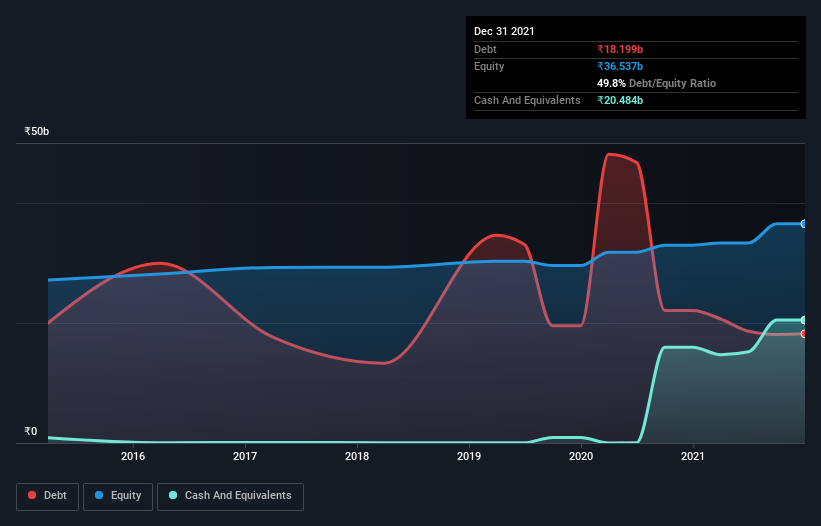Is Rashtriya Chemicals and Fertilizers (NSE:RCF) A Risky Investment?
Howard Marks put it nicely when he said that, rather than worrying about share price volatility, 'The possibility of permanent loss is the risk I worry about... and every practical investor I know worries about.' When we think about how risky a company is, we always like to look at its use of debt, since debt overload can lead to ruin. We can see that Rashtriya Chemicals and Fertilizers Limited (NSE:RCF) does use debt in its business. But the more important question is: how much risk is that debt creating?
When Is Debt A Problem?
Debt assists a business until the business has trouble paying it off, either with new capital or with free cash flow. Ultimately, if the company can't fulfill its legal obligations to repay debt, shareholders could walk away with nothing. However, a more usual (but still expensive) situation is where a company must dilute shareholders at a cheap share price simply to get debt under control. By replacing dilution, though, debt can be an extremely good tool for businesses that need capital to invest in growth at high rates of return. When we examine debt levels, we first consider both cash and debt levels, together.
See our latest analysis for Rashtriya Chemicals and Fertilizers
What Is Rashtriya Chemicals and Fertilizers's Debt?
The image below, which you can click on for greater detail, shows that Rashtriya Chemicals and Fertilizers had debt of ₹18.2b at the end of September 2021, a reduction from ₹22.1b over a year. However, it does have ₹20.5b in cash offsetting this, leading to net cash of ₹2.28b.

How Healthy Is Rashtriya Chemicals and Fertilizers' Balance Sheet?
The latest balance sheet data shows that Rashtriya Chemicals and Fertilizers had liabilities of ₹34.6b due within a year, and liabilities of ₹13.7b falling due after that. Offsetting these obligations, it had cash of ₹20.5b as well as receivables valued at ₹16.2b due within 12 months. So it has liabilities totalling ₹11.7b more than its cash and near-term receivables, combined.
While this might seem like a lot, it is not so bad since Rashtriya Chemicals and Fertilizers has a market capitalization of ₹50.5b, and so it could probably strengthen its balance sheet by raising capital if it needed to. However, it is still worthwhile taking a close look at its ability to pay off debt. Despite its noteworthy liabilities, Rashtriya Chemicals and Fertilizers boasts net cash, so it's fair to say it does not have a heavy debt load!
But the other side of the story is that Rashtriya Chemicals and Fertilizers saw its EBIT decline by 3.8% over the last year. If earnings continue to decline at that rate the company may have increasing difficulty managing its debt load. There's no doubt that we learn most about debt from the balance sheet. But you can't view debt in total isolation; since Rashtriya Chemicals and Fertilizers will need earnings to service that debt. So if you're keen to discover more about its earnings, it might be worth checking out this graph of its long term earnings trend.
Finally, while the tax-man may adore accounting profits, lenders only accept cold hard cash. Rashtriya Chemicals and Fertilizers may have net cash on the balance sheet, but it is still interesting to look at how well the business converts its earnings before interest and tax (EBIT) to free cash flow, because that will influence both its need for, and its capacity to manage debt. Over the last three years, Rashtriya Chemicals and Fertilizers actually produced more free cash flow than EBIT. That sort of strong cash generation warms our hearts like a puppy in a bumblebee suit.
Summing up
Although Rashtriya Chemicals and Fertilizers's balance sheet isn't particularly strong, due to the total liabilities, it is clearly positive to see that it has net cash of ₹2.28b. The cherry on top was that in converted 232% of that EBIT to free cash flow, bringing in ₹16b. So we are not troubled with Rashtriya Chemicals and Fertilizers's debt use. When analysing debt levels, the balance sheet is the obvious place to start. But ultimately, every company can contain risks that exist outside of the balance sheet. To that end, you should be aware of the 2 warning signs we've spotted with Rashtriya Chemicals and Fertilizers .
If, after all that, you're more interested in a fast growing company with a rock-solid balance sheet, then check out our list of net cash growth stocks without delay.
New: AI Stock Screener & Alerts
Our new AI Stock Screener scans the market every day to uncover opportunities.
• Dividend Powerhouses (3%+ Yield)
• Undervalued Small Caps with Insider Buying
• High growth Tech and AI Companies
Or build your own from over 50 metrics.
Have feedback on this article? Concerned about the content? Get in touch with us directly. Alternatively, email editorial-team (at) simplywallst.com.
This article by Simply Wall St is general in nature. We provide commentary based on historical data and analyst forecasts only using an unbiased methodology and our articles are not intended to be financial advice. It does not constitute a recommendation to buy or sell any stock, and does not take account of your objectives, or your financial situation. We aim to bring you long-term focused analysis driven by fundamental data. Note that our analysis may not factor in the latest price-sensitive company announcements or qualitative material. Simply Wall St has no position in any stocks mentioned.
About NSEI:RCF
Rashtriya Chemicals and Fertilizers
Manufactures, markets, and sells fertilizers and industrial chemicals in India.
Excellent balance sheet with proven track record.
Market Insights
Community Narratives




